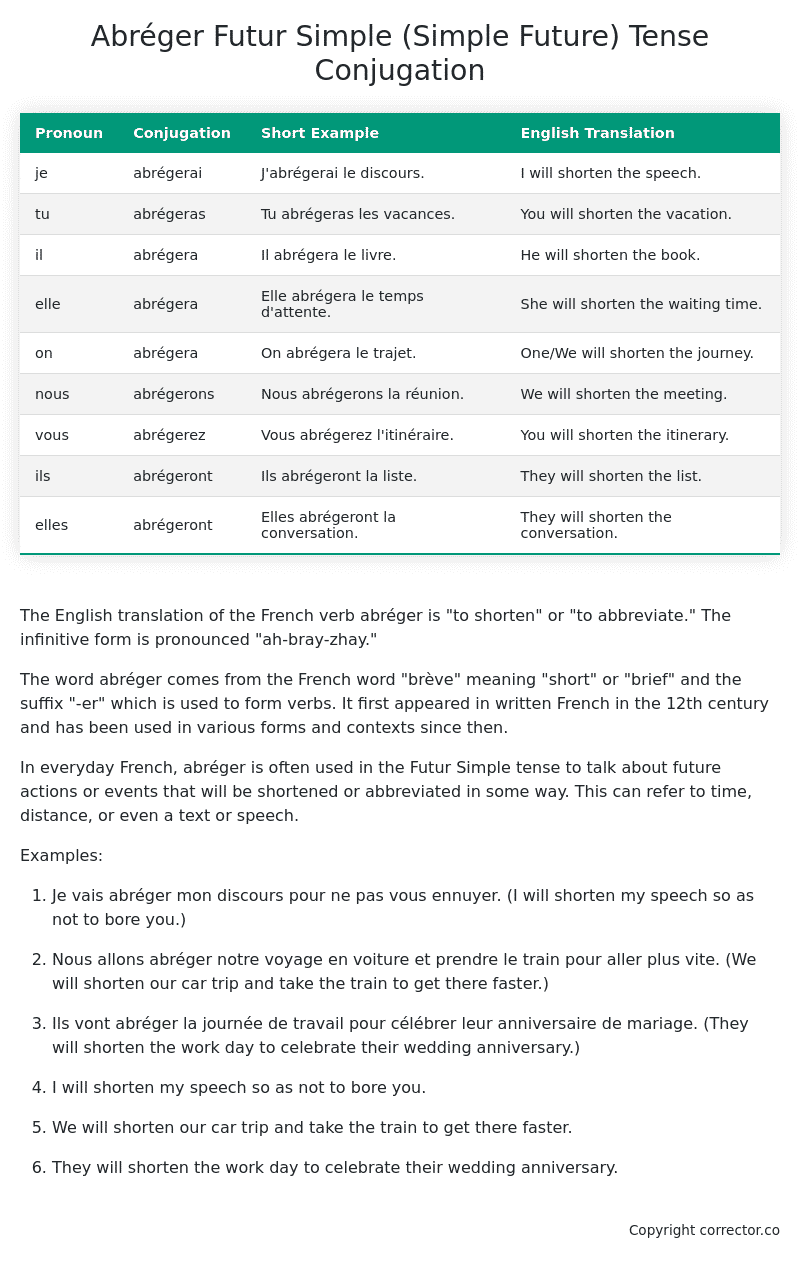Futur Simple (Simple Future) Tense Conjugation of the French Verb abréger
Introduction to the verb abréger
The English translation of the French verb abréger is “to shorten” or “to abbreviate.” The infinitive form is pronounced “ah-bray-zhay.”
The word abréger comes from the French word “brève” meaning “short” or “brief” and the suffix “-er” which is used to form verbs. It first appeared in written French in the 12th century and has been used in various forms and contexts since then.
In everyday French, abréger is often used in the Futur Simple tense to talk about future actions or events that will be shortened or abbreviated in some way. This can refer to time, distance, or even a text or speech.
Examples:
-
Je vais abréger mon discours pour ne pas vous ennuyer. (I will shorten my speech so as not to bore you.)
-
Nous allons abréger notre voyage en voiture et prendre le train pour aller plus vite. (We will shorten our car trip and take the train to get there faster.)
-
Ils vont abréger la journée de travail pour célébrer leur anniversaire de mariage. (They will shorten the work day to celebrate their wedding anniversary.)
-
I will shorten my speech so as not to bore you.
-
We will shorten our car trip and take the train to get there faster.
-
They will shorten the work day to celebrate their wedding anniversary.
Table of the Futur Simple (Simple Future) Tense Conjugation of abréger
| Pronoun | Conjugation | Short Example | English Translation |
|---|---|---|---|
| je | abrégerai | J’abrégerai le discours. | I will shorten the speech. |
| tu | abrégeras | Tu abrégeras les vacances. | You will shorten the vacation. |
| il | abrégera | Il abrégera le livre. | He will shorten the book. |
| elle | abrégera | Elle abrégera le temps d’attente. | She will shorten the waiting time. |
| on | abrégera | On abrégera le trajet. | One/We will shorten the journey. |
| nous | abrégerons | Nous abrégerons la réunion. | We will shorten the meeting. |
| vous | abrégerez | Vous abrégerez l’itinéraire. | You will shorten the itinerary. |
| ils | abrégeront | Ils abrégeront la liste. | They will shorten the list. |
| elles | abrégeront | Elles abrégeront la conversation. | They will shorten the conversation. |
Other Conjugations for Abréger.
Le Present (Present Tense) Conjugation of the French Verb abréger
Imparfait (Imperfect) Tense Conjugation of the French Verb abréger
Passé Simple (Simple Past) Tense Conjugation of the French Verb abréger
Passé Composé (Present Perfect) Tense Conjugation of the French Verb abréger
Futur Simple (Simple Future) Tense Conjugation of the French Verb abréger (this article)
Futur Proche (Near Future) Tense Conjugation of the French Verb abréger
Plus-que-parfait (Pluperfect) Tense Conjugation of the French Verb abréger
Passé Antérieur (Past Anterior) Tense Conjugation of the French Verb abréger
Futur Antérieur (Future Anterior) Tense Conjugation of the French Verb abréger
Subjonctif Présent (Subjunctive Present) Tense Conjugation of the French Verb abréger
Subjonctif Passé (Subjunctive Past) Tense Conjugation of the French Verb abréger
Subjonctif Imparfait (Subjunctive Imperfect) Tense Conjugation of the French Verb abréger
Subjonctif Plus-que-parfait (Subjunctive Pluperfect) Tense Conjugation of the French Verb abréger
Conditionnel Présent (Conditional Present) Tense Conjugation of the French Verb abréger
Conditionnel Passé (Conditional Past) Tense Conjugation of the French Verb abréger
L’impératif Présent (Imperative Present) Tense Conjugation of the French Verb abréger
L’infinitif Présent (Infinitive Present) Tense Conjugation of the French Verb abréger
Struggling with French verbs or the language in general? Why not use our free French Grammar Checker – no registration required!
Get a FREE Download Study Sheet of this Conjugation 🔥
Simply right click the image below, click “save image” and get your free reference for the abréger Futur Simple tense conjugation!

Abréger – About the French Futur Simple (Simple Future) Tense
Formation of Futur Simple
For regular -er verbs (e.g., parler – to speak)
For regular -ir verbs (e.g., finir – to finish)
For regular -re verbs (e.g., vendre – to sell)
Common Everyday Usage Patterns
Conditional Statements
Interactions with Other Tenses
Futur Antérieur
Conditional
Present
Summary
I hope you enjoyed this article on the verb abréger. Still in a learning mood? Check out another TOTALLY random French verb conjugation!


